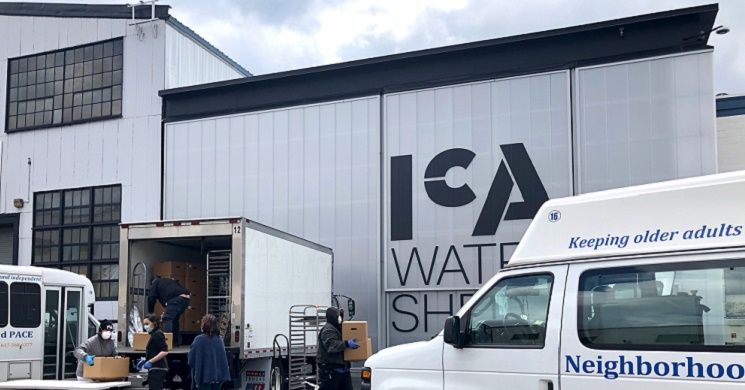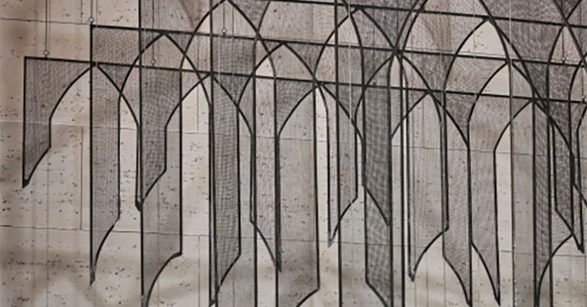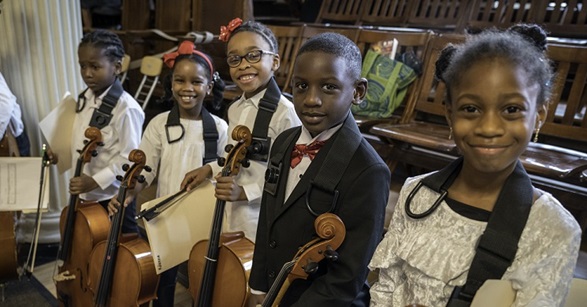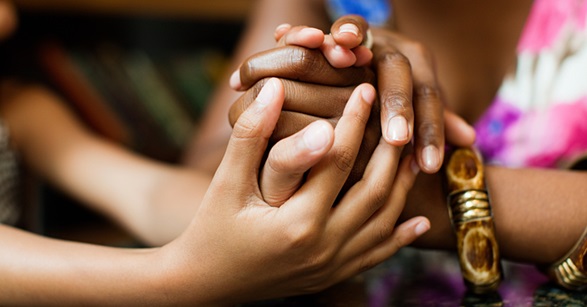As COVID-19 continues to impact the city of Boston, one organization is stepping outside of its typical role to help fill the critical needs of the community it calls home.
With the help of community groups, The Institute of Contemporary Art (ICA) transformed its Watershed site, a 15,000-square-foot arts venue located in East Boston, into a food distribution hub to provide fresh produce and dairy products to local, under-resourced families.
After learning of the dire need for fresh food in East Boston, the ICA immediately contacted the museum’s caterer, The Catered Affair, to see if they could help. The Catered Affair’s Founder, Holly Safford, along with her two sons, offered to donate their time and labor to package fresh food boxes to serve 400 families over the course of four weeks.
We spoke with Kelly Gifford, Deputy Director for Public Engagement and Planning, and Monica Garza, the Charlotte Wagner Director of Education at the ICA, to learn how they managed to bring together community stakeholders to execute a bold plan — all within a week.
As an arts institution, museums usually don’t distribute food. What prompted this idea?
Kelly: Before we even opened the Watershed in the summer of 2018, we started off by asking our community partners — Maverick Landing Community Services, East Boston Social Centers and East Boston Neighborhood Health Center (EBNHC) — what they needed, and we incorporated that into the Watershed. Coming to this point now, although it seems really odd for an art museum to do this, it’s been part of a long, ongoing process and conversation.
Monica: This conversation around food distribution really started with contacting our community partners: having conversations and listening to where they’re at during the pandemic. One thing that became apparent very quickly was that there was a big need for fresh food in East Boston.
Why did you feel it was important to expand beyond your arts role at this time?
Kelly: The way we view the ICA in general is that it’s a civic and community resource. When you look at our exhibitions, performances and programs, it is an intersection of art and civic life, at its core, and that’s where the DNA of the Institute of Contemporary Art is.
Monica: To give one example of our many programs: for about seven years now, we have partnered with Boston public schools so that teenagers can take classes at the ICA and get their required arts credits for graduation. Again, as Kelly said, this is part of our DNA, this is what we do, and this is all in collaboration with our city.
What needs are you meeting in East Boston by undertaking this initiative?
Kelly: We listened to our community partners and learned that they were getting food for their low-income families in need through the local food banks, which offered pantry and shelf items, but they weren’t able to get — for various reasons — fresh produce and dairy.
After Monica and I had the first call with the community partners, it became very clear how dire and urgent the needs were in the community. To understand what these families were going through — living where they’re living, being unemployed, being laid off or having three generations of a family infected in the same household and not being able to get the food you need — it really shakes you.
That same day, we reached out to The Catered Affair, our in-house catering company, and shared that there was this need in East Boston. They jumped on it. They got in contact with their wholesale produce vendor and it literally came together in a week. Everybody jumped in. The Catered Affair donated all the labor and delivery, so we were able to get the families what they needed in a safe way.
Can you tell us a bit about the ICA Watershed and how it has been used in the past?
Monica: This is a space right by the water where people can enjoy contemporary art. In addition to that, we’ve started to offer different types of programming, including programming for families. We started a Teen Harbor Collective at the ICA, where we have given youth paid opportunities to work with us and work with different community organizations to bring in art activities and other types of art experiences.
Kelly: One of the things that Monica and I learned really early on — even before we opened the Watershed — was that community partners were really looking for a space to bring families and kids. The Watershed is free, it’s 15,000 square feet, and it has incredible, immersive installations. Outside of the summer season, we also have been trying to figure out — with our community partners — how best to utilize the space.
We were able to donate the space to local nonprofits for their community fundraising events, right in their neighborhood. From there, we moved forward with the EBNHC with a program they have for kids and teens around health and obesity issues, called “Let’s Get Movin'.” In the winter months, they moved to the Watershed and were able to utilize it as an indoor play field or gym to host family activities over the course of six weeks. We also had a big meeting in 2019 with community officials about the impact of climate change in Boston and the city’s different plans to mitigate those issues. Every single year it seems to grow as we get to know each other more. It’s been great for the Watershed to be used throughout the year, and I know that our partners have been happy to have the space for their needs.
How are partnerships important to undertake an initiative like this?
Kelly: You have to start from a place where you’re actually listening and understanding what your community partners need; we were able to have a conversation with them. But it absolutely would not have happened without The Catered Affair. We are an art museum; we don’t have that expertise. It is a big lift for The Catered Affair, too. To protect employee safety, the owners, Holly Safford and her two sons Andrew Marconi and Alex Marconi, and a few other employees went in and boxed up all the food and dairy, and ensured that it was kept refrigerated. They have been a huge part of this effort operationally to make this happen.
The other really big asset we had was Kathy Field, Director of Health Promotion and Program Services of EBNHC. They put together a system to ensure that the food and the staff were all safe and that we weren’t helping to spread the coronavirus. I think that having those resources — somebody who understands health and the disease overall, and having somebody on the food side — was really the reason we were able to do this.
Monica: All of the organizations themselves had the relationships with the different families where the food is being delivered; a lot of them already had an infrastructure in place to make sure that those families in most need would have food at their homes. We’re very grateful. Partnerships and relationships are at the core of everything we do at the ICA, but it became really pivotal for this initiative.
What are some new things ICA had to learn or adjust to in order to make this idea a reality?
Kelly: At first, we had one idea of how we would do this: there would be food at the Watershed, and people would come down to pick it up. Very quickly, Kathy Field told us that’s not how you safely get food to people. It was completely eye-opening just to see how these organizations work with the families that they’re serving, how tirelessly they work and how open-hearted they are. Their whole goal is to ensure the health and safety of their community, and it’s been really inspiring.
Monica: Speaking as an education director, we at ICA are tasked to work with different communities and connect them with art, but this pandemic really puts everything into perspective for everyone around the world. It’s not just about connecting people with art, but also taking care of the communities, as well. I’m very humbled to be a part of this project, and I’m just really grateful that the ICA agreed to take this on.
What type of impact have you seen so far? Has any part of the response been surprising?
Monica: One of the things that we’ve been doing since the start of this quarantine is contacting everyone in our networks, including community partners in East Boston and youth in our teen programs. Just hearing the stories of what everyone is going through right now, it does shake you up quite a bit. So we are trying our best to help our communities.
I would say that the response has been both heartbreaking and heartwarming. It’s heartbreaking to hear all of the challenges, but it’s heartwarming to hear how a box of produce has made such an impact in a household. We’ve already gotten drawings from children who have received deliveries to their homes. The response has been very positive, and we’re very grateful to know that. It just says that there’s a lot of heart involved — everyone working together to make it happen. We just had to make it happen.
The ICA will continue to use the Watershed as a food distribution site through September 3, 2020.
[Photo credit: Courtesy of ICA. Staff from the East Boston Neighborhood Health Center, one of the key partners in this initiative, unload boxes of fresh food.]




